This chicken congee is silky smooth, richly flavored, and deeply comforting. It’s perfect for recovering your energy, but tasty and easy enough for any occasion. My recipe uses common ingredients to create authentic Chinese flavor, and you can even make it in your Instant Pot. {Gluten-Free Adaptable}
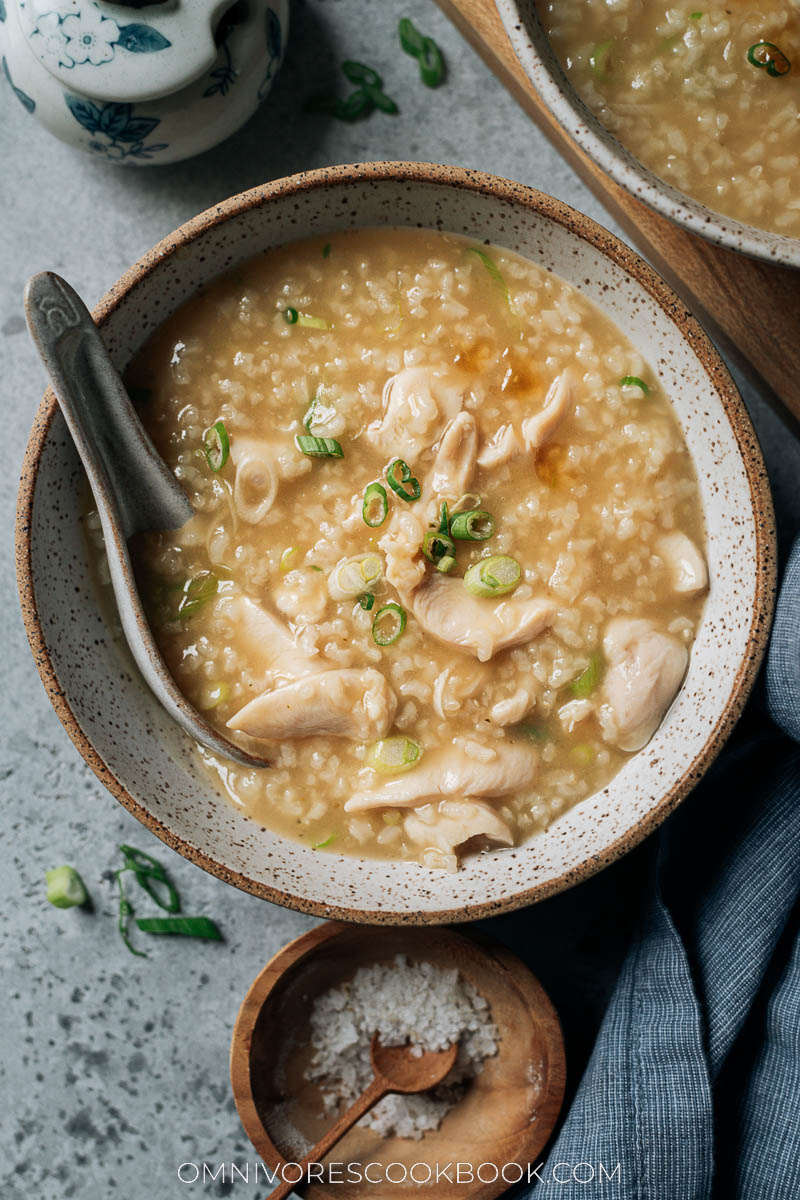
Chicken Congee: Classic comfort any time you want it
For me, chicken congee is the ultimate one-pot meal. Something about the texture and warmth of the rice porridge just makes it so enjoyable to eat, and with the thick consistency brings a lovely concentrated flavor that stays with you.
When I’m feeling under the weather, chicken congee is the perfect medicine. Even if I’m feeling fine, though, the familiar goodness of chicken congee is invigorating and satisfying.
Ask any Chinese person about congee and they’ll probably tell you something similar. This very simple dish has a magical ability to help you relax and lift your mood. If you like congee, also check out my seafood congee, century egg congee, eight treasure congee and breakfast congee recipes.
Given the importance of this dish, I wanted to make it extremely easy for you to prepare a pot of tasty and reliable chicken congee whenever you feel the need.
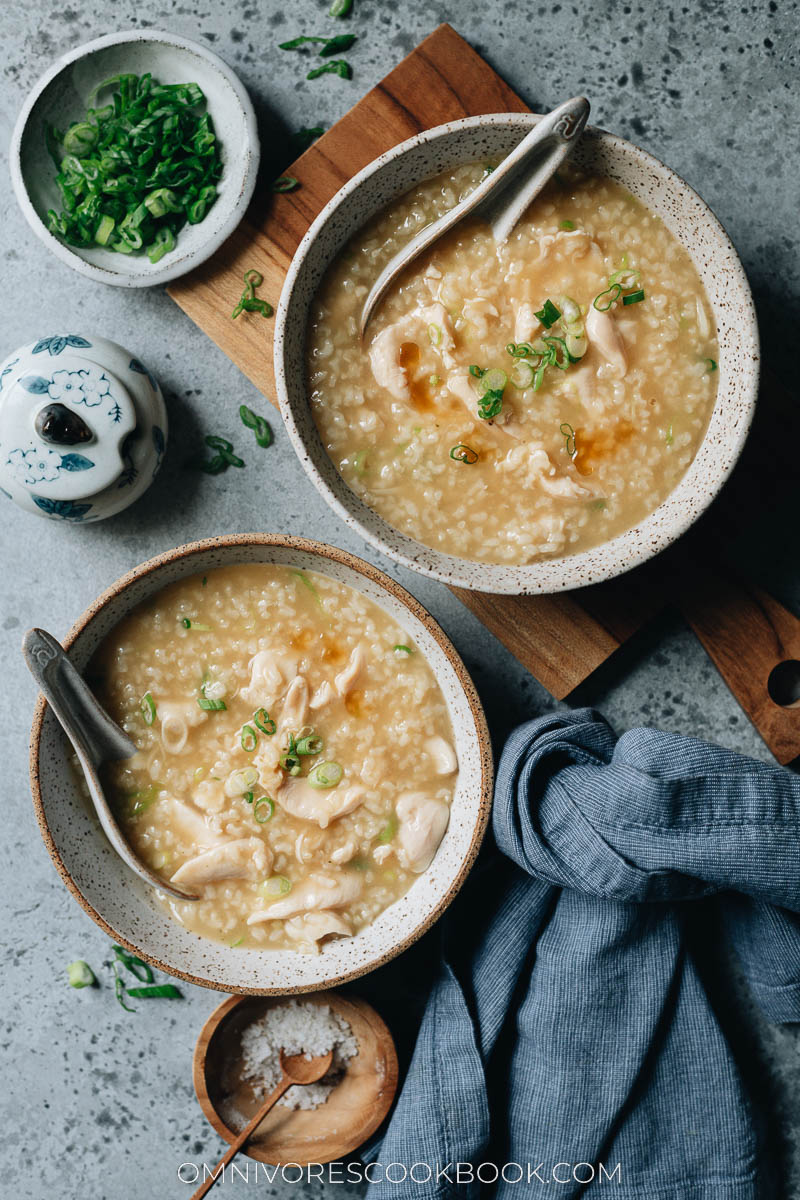
Simple ingredients for authentic Chinese chicken congee
The recipe I’m sharing today is one of the most widely enjoyed types of congee. It features a meltingly smooth concentrated chicken broth, tender chicken meat, and the delightfully aromatic ginger, green onion, and sesame oil.
Part of the beauty of the dish is that it uses very simple and very common ingredients. Chances are, you probably have them on hand if you do any Chinese cooking.
Choose a good chicken broth
Since chicken congee uses very few ingredients to season the soup, it’s important to find a good quality broth base. My favorite chicken broth is the Kirkland Signature Organic Chicken Stock from Costco. It is so much richer than the many other brands I’ve tried.
My other favorite is Better than Bouillon Roast Chicken Base and I always keep a jar of it in the fridge. It has a super rich taste and I like to use it as a base for soup and stew, and sometimes stir fries. For this recipe, simply use 1 heaping tablespoon of the chicken base dissolved in water to replace the chicken broth.
If using another type of chicken broth and its flavor is mild, it is also helpful to use a touch of chicken bouillon at the end to further enhance the flavor.
What type of rice to use for chicken congee
It’s important to use a short grain white rice for congee because it will release starch and produce a creamy, silky texture. This texture is a big reason this congee is so satisfying.
Medium grain rice is OK but not ideal. I do not recommend long grain rice for congee.
Use use chicken breasts or thighs
Normally, I prefer chicken thigh over breast because it’s more flavorful, but chicken breast actually works quite well here. Since the chicken is quickly poached in the hot congee, there’s less risk of overcooking and the result will be juicy and tender.
Fresh aromatics add aroma to congee
Using fresh green onion and ginger will give the congee a subtle fragrance that is common throughout Chinese cooking.
I don’t recommend replacing either of these with dried or frozen versions.
Shaoxing wine tenderizes the chicken and adds flavor
Shaoxing wine may be the most unusual ingredient on the list. If you cook Chinese food at home, you should already have it, but if you don’t, you can use dry sherry instead.
You’ll use it in the marinade and in the congee itself. In the marinade it tenderizes and enhances the flavor of the chicken and in the congee it lends its umami, slightly nutty flavor.
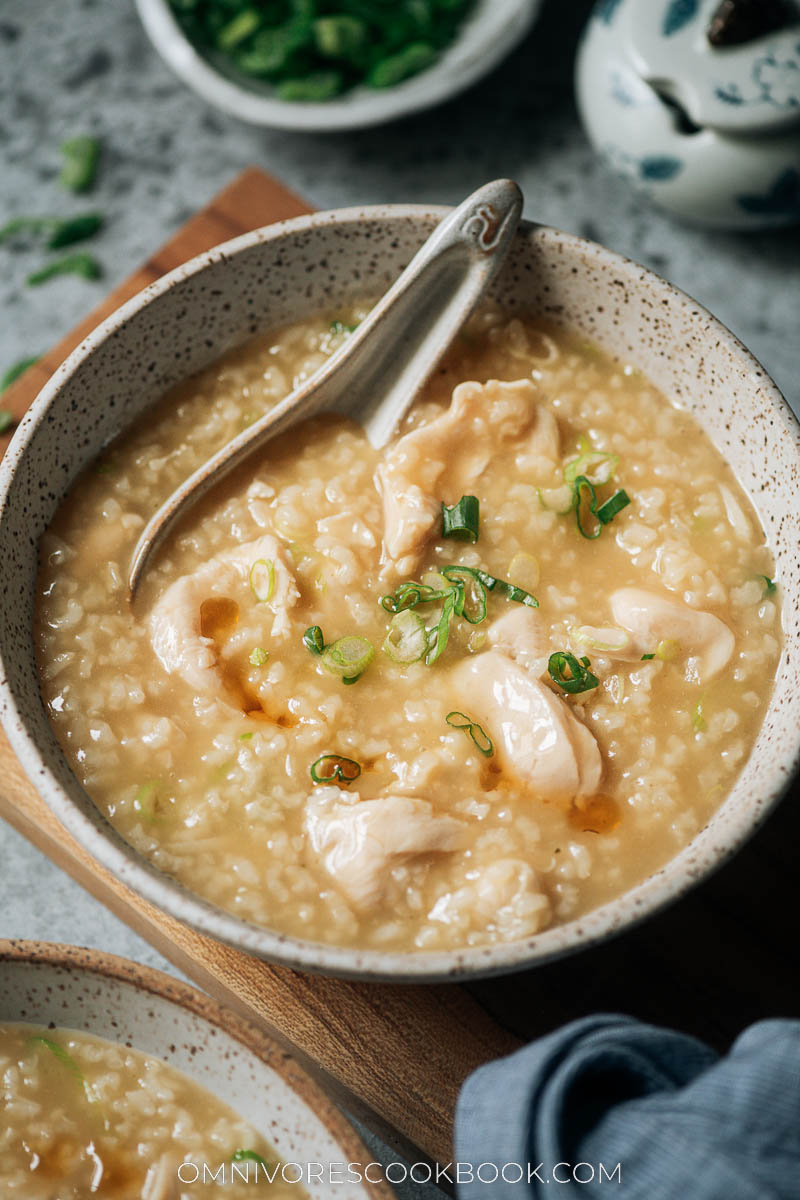
How to cook chicken congee
Cooking chicken congee is super easy, especially if you use an Instant Pot or pressure cooker.
- Add the rice, chicken broth and ginger to a big pot
- Cook until the rice is tender and the congee has become creamy
- Add the chicken, bouillon (or salt) and green onion
- Cook until the chicken is just cooked through, then finish up with sesame oil
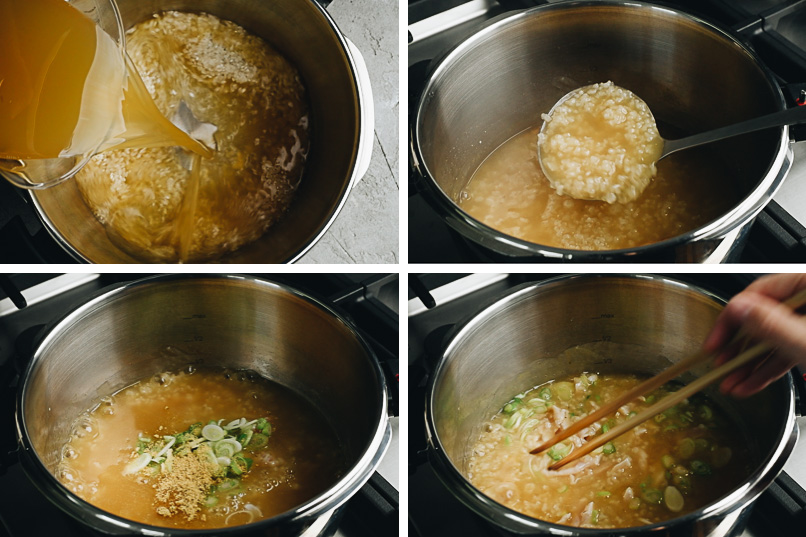
Make chicken congee on the stovetop or in Instant Pot
Since congee is one of those dishes that comes out really nicely in the Instant Pot, I have included the instructions for the Instant Pot version below as well.
I personally prefer the Instant Pot method. The texture of Instant Pot chicken congee is silkier and creamier than the stovetop version, because the high pressure releases more starch from the grain.
The Instant Pot version is easy and convenient because you can set it and forget it, and the texture will come out great. You don’t have to supervise the pot for overboiling or scorching and the device tracks the time and releases pressure automatically.
If you cook the chicken congee on stove top, you should stir it every 15 minutes, and keep a close eye on it towards the end of the cooking.
Final Thoughts
Chicken congee is a great example of a dish that is super satisfying yet easy to make and uses very simple ingredients. It is a hugely popular comfort dish among many Chinese who ate it growing up, as well as many non-Chinese converts who have grown to love it.
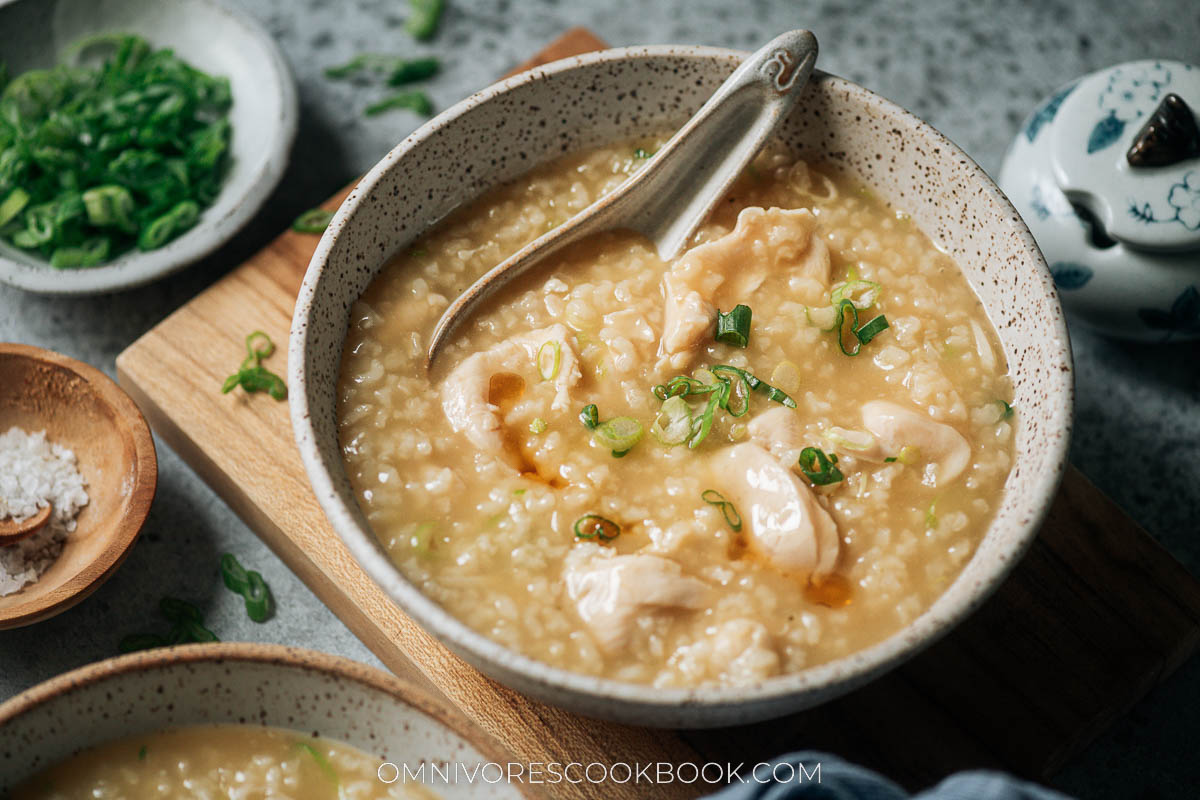
Pair chicken congee with
- Fried Wontons (Air Fryer Version included)
- Chinese Okra Salad, Two Ways (凉拌秋葵)
- Bok Choy and Mushroom Stir Fry
- Shredded Beef and Pepper Stir Fry (青椒肉丝)
- Scallion Beef Stir Fry (葱爆牛肉)
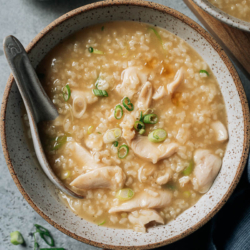
Chicken Congee (Instant Pot Version Included) 鸡粥
Marinating
- 8 oz (227 g) chicken breast or tender, or thigh, thinly sliced
- 2 teaspoons Shaoxing wine
- 1/2 teaspoon salt
- 1 teaspoon cornstarch
Congee
- 1/2 cup (120 ml) uncooked short grain white rice (or medium grain)
- 4 cups chicken broth (*Footnote 1)
- 1 tablespoon Shaoxing wine (or dry sherry)
- 2 large slices of ginger
- 2 green onions , thinly sliced
- 1/4 teaspoon chicken bouillon , or to taste (or salt)
- 1 teaspoon toasted sesame oil
- Add the rice into a medium-sized bowl and water to cover. Gently rinse the rice a few times with your fingers and drain. Repeat one to two more times. Drain well.
Method 1 – Use an Instant Pot
- Combine the rice, stock, Shaoxing wine, and ginger in your Instant Pot. Set it to cook at high pressure for 15 minutes. If using a pressure cooker, cook over medium heat until pressure is added, then cook at low heat for 15 minutes. Once done, release the pressure naturally for at least 10 minutes before releasing it quickly. Note, do not use fast release right after cooking, because the congee is starchy and might cause the valve to clog. Once the pressure is fully released, cook the chicken per the steps below.
Method 2 – Stovetop method
- Combine the rice, stock, and 4 cups of water in a big pot.
- Cook over medium-high heat until brought to a simmer. Turn to low heat. Cover the pot and leave a finger-wide gap between the lid and the edge of the pot, to allow more steam to escape and prevent the congee from spilling or boiling over. Simmer for 30 minutes. The congee will get quite thick and sticky towards the end. Stay near the pot and stir frequently. When the congee reaches the desired texture, start cooking the chicken.
Marinate and cook the chicken
- While the congee is cooking, add the chicken, Shaoxing wine, salt and cornstarch in a medium-sized bowl. Mix well until the chicken is evenly coated. Set aside to marinate.
- When the congee is cooked, add the marinated chicken, green onion, and chicken bouillon. Turn to medium heat (or saute function for Instant Pot). Stir constantly to separate the chicken pieces. Cook until the chicken just turns white, 2 minutes or so.
- Add the sesame oil. Stir to mix well. Taste the congee and add more salt if needed.
- Transfer the congee into small bowls and serve hot.
- If you cook the dish on the stovetop, you might need a bit more chicken stock or water, depending on how much liquid evaporates during the cooking process.
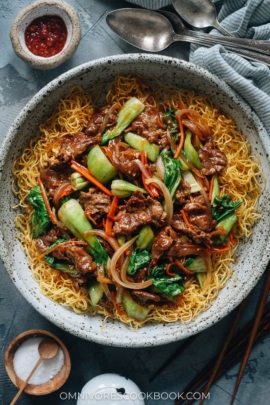
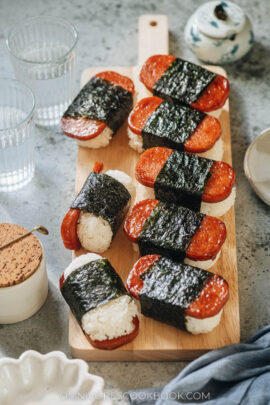
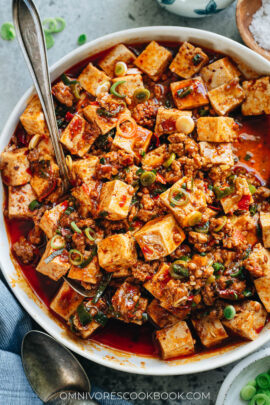
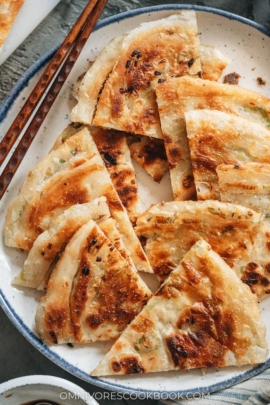
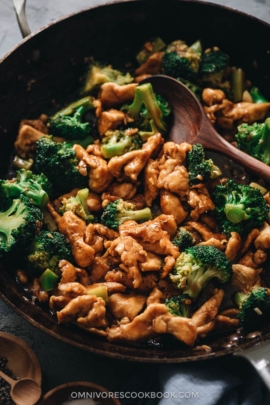
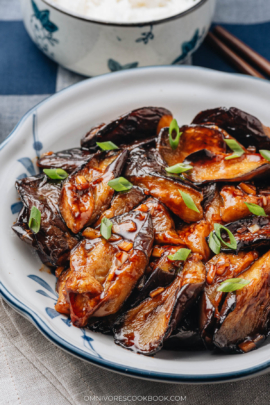
I love congee, but am still confused about what rice to use–when you say “short grain”, I know I can buy “sushi rice” and it will work, but what about the white glutinous rice that I can buy in my Asian market? Is that the same–does “short-grain” always mean “glutinous”? I always steam glutinous rice for “sticky rice”, but if I boil it as you say here, will it work for congee? Thank you for making sense of this for mje! I love your site.
Sushi rice is short grain rice and will definitely work. If you purchase rice at Asian market, you will see the label “short grain rice”, which is usually the type similar to sushi rice but cheaper.
Glutinous rice is totally different and I wouldn’t use it for congee. I think the texture will be too gooey.
This is perfect! So good! Thank you!
So happy to hear you like the recipe! And thanks for leaving a positive review 🙂
I cooked it this morning in my Instant Pot and it was delicious. I used smoked turkey for the broth that I also cooked in my Instant Pot yesterday and topped it with onsen tamago (also cooked in the IP). To say it was awesome, would be an understatement. Thank you!
Maggie, I have a question about fresh ginger. I noticed in Chinese cooking uses ginger often. I bought some fresh finger-size ginger, I cut a little slice and chewed on it and found it quite bitter and I’m reluctant to use it. Can you explain the umami of it? What am I missing?
I’m learning so much info from your recipes, even though I don’t prepare them all. But I do some.
Thank you, Russ, in Lodi California.
It is strange that it tasted bitter. Did you chew on the skin or the fresh part? If the ginger is fresh, it should be crisp, spicy, peppery, and a bit grassy. The surface should be quite smooth, and the inside is page yellow and juicy.
A very comforting dish made with left over turkey. Will make again. Thanks so much, Maggie!
My reflux has been terrible lately, so I’ve been on a bland diet. This was a simple and mild dish, perfect for my tummy, but it was also very delicious and comforting. As a Cajun, I would prefer this rice dish to chicken noodle soup, so I’ll definitely be making this again!
I’m confused. “2 ginger large slices” 2 what? Two slices? 2 inches of ginger? Ginger roots come in all sizes so i don’t understand how much to use. And could I mince the ginger so i can eat it in the broth?
Sorry about the confusion. The recipe format was messed up when I copy pasted. It should be 2 large slices of ginger – I usually use a thumb of ginger that’s about 2″ long and slices 2 pieces off. It’s just a convenient way to infuse the flavor without spending too much time cutting.
If you plan to eat the ginger, you can definitely mince it. I would use anywhere between 2 teaspoons to 1 tablespoon (for a very gingery taste) minced.
This is fantastic in the insta pot. I’ve actually used Haiga rice and it tastes great
Been having a tough time at work. Thank you so much for this. It really helped me get through.
Do you use the wine in the rice cooking and the chicken cooking? If so, how much in each?
I used 2 teaspoons wine in the chicken and 1 tablespoon in the congee.
This is one of my favorite recipes to make. It is so delicious yet so simple! Other congee recipes tend to be a bit bland for my liking, so I have always loved how flavor packed this recipe is. I cannot recommend it enough, thank you so much for sharing this with us!
Hi Maggie, a bit confused. If cooking on the stovetop, is it 4 cups broth PLUS 4 cups water? Seems like an awful lot for 1/2 cup rice. Can you please clarify? Thanks very much.
Hi Jeana, yes, you will need totally 8 cups of liquid. It might seem like a lot, but some of the water will evaporate, and some got absorbed by the rice. So at the end, you will get a nice consistent congee. If you’re worried, you can start out with less liquid (4 cups broth + 2 cups water). It will give you a quite thick congee but some people do like that texture. And if the congee is too thick, you can add hot water towards the end to adjust its consistency.
PS. Just a reminder that I used a regular cup, so half a cup of rice is 120 ml, more than 1/2 of a rice cup.
Love this insta pot chicken congee, so tasty and easy to make!
Is the chicken broth the same as chicken bone broth? I’m from Australia and all I can find to buy is bone broth
You can totally use bone broth in this recipe!